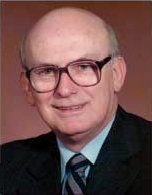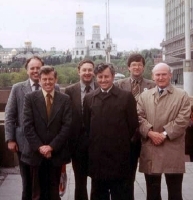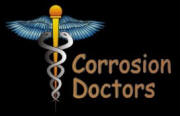Redvers Parkins (1925-2004)
Redvers N. Parkins was. widely recognized for his exceptional work in the field of environment-sensitive fracture. His scientific career spanned half a century and was notable for its contribution to our present ability to design against failures that result from the conjoint effects of stress and corrosion. A native of Willington, Co Durham, he was educated at King's College of the University of Durham from which he graduated with First Class honors in 1947. (reference)

His career began with an appointment as Lecturer in Metallurgy in the same department at Newcastle upon Tyne, a post he held until 1960. In 1948, he was presented with the Saville Shaw Medal of the Society of Chemical Industry, and three years later he was awarded the degree of Doctor of Philosophy for a thesis entitled "The Stress Corrosion Cracking of Mild Steels".
His earliest publications from the 1950s are recognized as providing the foundations of our understanding of the stress corrosion cracking process and he has remained one of the most active researchers of environmentally-assisted cracking, now having about two hundred publications to his credit. His work often highlighted the interactions between both electrochemical and mechanical factors which contribute to the initiation and growth of stress corrosion cracks, and he originated the concept of a continuous spectrum between anodic and cathodic cracking processes.
Between 1960 and 1974, Redvers was Reader in Metallurgy at the University of Newcastle upon Tyne, where he led a very active research group whose activities included the development of the slow strain rate test method as a means of determining susceptibility to stress corrosion cracking under the dynamic straining conditions that are encountered in many service situations. At the same time, he maintained a very demanding teaching schedule, providing inspiration to students in each of the three undergraduate years. He still found time to become a visiting Fellow of the Mellon Institute, Pittsburgh, USA in 1966, and from 1968 he often spent up to two months each summer carrying out research at Battelle Memorial Institute, Columbus, Ohio, USA. In recognition of his published work in the field of stress corrosion cracking, he was awarded the degree of Doctor of Science by the University of Newcastle upon Tyne in 1972.

An appointment as William Cochrane Professor of Metallurgy and Head of the Department of Metallurgy and Engineering Materials at the University of Newcastle upon Tyne followed in 1974 and he retained this position until his retirement in 1990. After that time he maintained a prolific workload and output as Emeritus Professor, University of Newcastle upon Tyne.
Throughout his career, Redvers made an unstinting and effective contribution to many national and international committees. He belonged to committees of the Department of Trade and Industry, the National Physical Laboratory and the United Kingdom Atomic Energy Authority. He chaired Corrosion Committees of the British Standards Institution, the International Organization for Standardization, the European Federation of Corrosion, and the Materials Preservation Group of the Institute of Corrosion. He was a President of the Institute of Corrosion and, from 19931994, of NACE. He also lectured in many countries around the world and led UK Government delegations to Hungary and the USSR (see photo) for exchanges in the fields of corrosion and corrosion fatigue.
His achievements received recognition through many awards, including: the Willis Rodney Whitney Award of the National Association of Corrosion Engineers (1978); the Samuel Tour Award of the American Society for Testing and Materials (1979); the Cavallaro Medal of the European Federation of Corrosion (1985); the U.R. Evans Award of the Institute of Corrosion (1988); the Donald Julius Groen Prize of the Institution of Mechanical Engineers (1989); the Distinguished Lecturer Award of ASM International (1990); the R.A. Brannon Award of the National Association of Corrosion Engineers (1991), the Kroll Medal and Prize of The Institute of Metals (1991) and the European Corrosion Medal of the European Federation of Corrosion in 1996.
Redvers Parkins made what is unquestionably one of the most significant contributions to the field of stress corrosion cracking and its avoidance. His work had impact in many industries and he was responsible for the development of the slow strain rate test, which is now an internationally accepted method for determining susceptibility to stress corrosion cracking. He loss will affect everyone who knew him, many of whom benefited from his help and kindness.

Connect with us
Contact us today